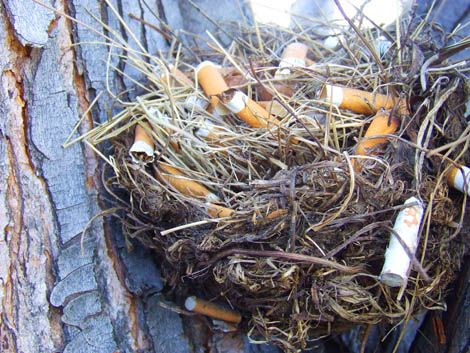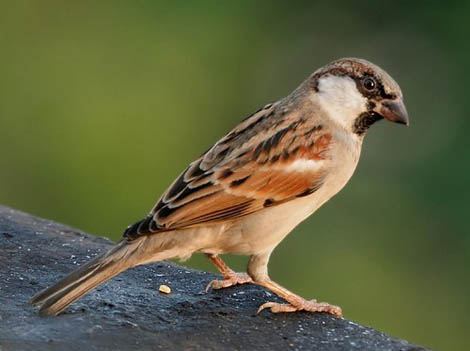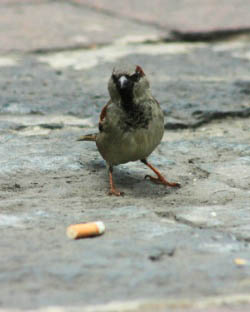 While the title may seem a little shoddy, the content of this text is anything but provocative.
While the title may seem a little shoddy, the content of this text is anything but provocative.
Well, maybe it is for some living beings.
The butts we are talking about are the butts of cigarettes after being smoked or, in Brazilian Portuguese, the butts or cigarette butts.
But why talk about the terminology of a product so harmful to health and, worse, mix it with nests?
It's just that, sometimes, nature takes turns where you least expect it. In this case, it was found that some birds in Mexico City use cigarette butts to build their nests.
The behavior was observed and evaluated by investigators from the National Autonomous University of Mexico, who used an experimental procedure to prove the influence of cigarette butts on parasites that attack bird offspring. Scientists found that nests with smoked cigarette butts had fewer external parasites than those built with unsmoked cigarette butts.
Well, nothing special, the most radical will scoff, adding that tobacco is so bad that even the parasites can't stand it.
 The researchers found that birds that use butts in their nests, sparrows (Passer domesticus) and the finch species carpodacus mexicanus, may do so using a natural insecticide, since the ends of cigarettes preserve amounts of nicotine and other chemical substances.
The researchers found that birds that use butts in their nests, sparrows (Passer domesticus) and the finch species carpodacus mexicanus, may do so using a natural insecticide, since the ends of cigarettes preserve amounts of nicotine and other chemical substances.
An English friend of mine had already described to me that cold infusions of cigarette butts when poured into potted ornamental plants make them healthier. Or so he says.
These researchers have not ruled out the hypothesis that birds use butts as a thermal coating for their nests, since they have cellulose. Nor do they rule out that the advantages of birds using nicotine as a dewormer are nullified by the toxic effects of smoking chemicals.
Although not fully understood, the authors propose two hypotheses for the behavior of birds: the chemical substances present in cigarette butts may stimulate the immune system of the offspring and, thus, favor their chances of survival. The second hypothesis suggests that the chemicals present in cigarette butts may have a more direct, evident and already mentioned role: butts would be a natural insecticide, which would disinfect the nests of external parasites.

Forgetting nicotine infusions and hoping that the hypotheses raised are tested, what urban birds seem to have discovered is the reuse of the chemical arsenal of cigarettes in favor of their offspring.
Contrary to what Chekov wrote, these Mexican birds discovered the benefits of tobacco. Apparently.
References:
Suarez-Rodriguez M., Lopez-Rull I. & Macias Garcia C. (2012). Incorporation of cigarette butts into nests reduces this ectoparasite load in urban birds: new ingredients for an old recipe?, Biology Letters, 9 (1) 20120931-20120931. DOI: 10.1098/rsbl.2012.0931
Images:
Photo 1 (nest): http://idreamofeden.wordpress.com/2011/04/18/birds-nest-of-the-future-americans-and-their-waste/
Photo 3 (bird with cigarette butt): http://blogs.scientificamerican.com/culturing-science/2012/12/04/cigarette-butts-in-nests-deter-bird-parasites/
 Author Luis Azevedo Rodrigues is a professor, doctorate in Paleontology, science promoter and Executive Director of the Centro Ciência Viva de Lagos. He is also the author of the blog Science in the Natural .
Author Luis Azevedo Rodrigues is a professor, doctorate in Paleontology, science promoter and Executive Director of the Centro Ciência Viva de Lagos. He is also the author of the blog Science in the Natural .


















Comments